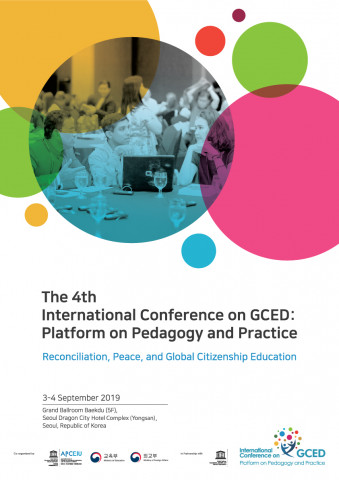
GCED Basic Search Form
Quick Search
Usted está aquí
Events

Background
Global Citizenship Education (GCED) aims to equip learners of all ages with knowledge, values, skills, and attitudes so that they can live together peacefully and become active and responsible citizens who will work together to tackle today’s pressing challenges. It nurtures respect for diversity and fosters solidarity on the basis of a sense of belonging to a common humanity. GCED has been given fresh impetus recently with Sustainable Development Goal 4.7 incorporating it as one of the key topics to be mainstreamed in education at all levels by 2030.
Learning to live together is particularly difficult in societies where conflicts and wars took place or are taking place. In these conflict and post-conflict situations, memory of violence and tragedy is so prevalent among many people that they can hardly find ways to reconcile with those who are believed to have perpetrated such acts. Reconciliation gets even more difficult and complex when such questions are asked: whether reconciliation should be sought at the expense of truth and justice; who should first take the initiative of reconciling with those involved; whether reconciliation process should operate at inter-personal level or inter-group level. Citizenship education is crucial in such situations, since it plays a key role in identity formation. While it develops loyalty to the state and thus contributes to a sense of national unity, it can also be problematic in conflict-affected countries (Smith 2010).
Against this background, global citizenship education is advocated by many theorists and practitioners as a way to enable people to build and maintain long-lasting peace particularly in post-conflict societies. Through its transformative pedagogy, local identities and divergent collective memories are critically questioned and responsibility to humankind and shared values are underscored to overcome and bridge divisions (Reilly and Niens 2014).
The potential for GCED to contribute to reconciliation and peace can be important for almost all countries. With only a few exceptions, all countries in the modern world have experienced violent conflicts, internally and/or externally. Pain and wounds are still lingering in the minds of peoples in these countries, and reconciliation and peace remain as one of the most challenging issues for them. However, GCED’s potential for reconciliation has yet to be fully explored. How can reconciliation be approached from the perspective of GCED? What does the difficult process of reconciliation tell us about GCED? How can transformative pedagogy of GCED concretely contribute to reconciliation? These are some of the questions that should be addressed in investigating the relationship between GCED and reconciliation.
The Asia-Pacific Centre of Education for International Understanding under the auspices of UNESCO (APCEIU) has held annual conferences on GCED since 2016. The conferences have dealt with such topics as ‘SDGs and GCED,’ ‘GCED in Challenging Situations,’ and ‘Localization of GCED.’ The 4th International Conference on GCED in 2019 will focus on ‘Reconciliation, Peace, and Global Citizenship Education.’ This conference aims to demonstrate GCED’s unique potential in relation to reconciliation and solidarity, and that this potential can be fully harnessed first through promoting the use of transformative pedagogy, and second, by systematically mainstreaming GCED in terms of policy, curriculum and teacher training.
Objectives
As an international platform for sharing and exchanging ideas and practices on GCED, the conference will pursue the following objectives:
- Exploring the potential of GCED for reconciliation focusing on its transformative pedagogy
- Reflecting on existing cases of reconciliation process and drawing lessons for GCED
- Searching for ways to mainstream GCED in policy, curriculum, and teacher training
- Sharing innovative experiments to unlock the power of GCED
- Mobilizing broad-based support for accelerating the implementation of GCED
Participants
More than 600 persons are expected to participate in the conference:
- Education policy-makers in central and local governments
- GCED experts, leaders and practitioners
- Educators, youth and parents
- International/regional/national organizations and civil society organizations
- GCED-specialized organizations and institutes
- Representatives from the private sector
- Citizens who are interested in GCED
Expected Outcomes
- Enhanced understanding of the relationship between reconciliation and GCED
- Important lessons from reconciliation processes identified for GCED
- Good practices and pedagogical methods on GCED shared
URL:
